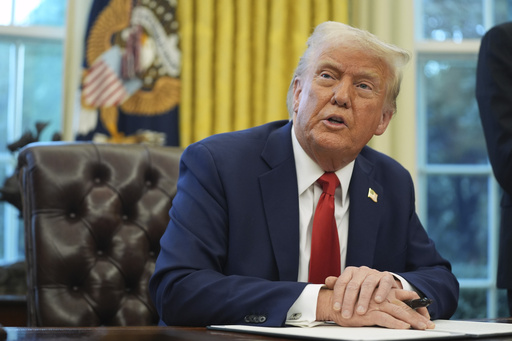
CAPE TOWN, South Africa — U.S. President Donald Trump has announced intentions to withdraw all financial support to South Africa, citing what he describes as violations of human rights. His comments seem rooted in Elon Musk’s frequent and unfounded assertions over the years that the South African authorities are targeting white individuals and even promoting violence against them.
On Sunday, Trump remarked that “terrible things are happening in South Africa” due to its leadership. He indicated that land confiscation was a key issue, claiming that actions being taken could be considered “far worse” than the loss of land itself, without offering detailed explanations for his statements. Trump’s remarks likely refer to new legislation in South Africa empowering the government to expropriate land under certain conditions.
Musk, a close ally of Trump and now leading the Department of Government Efficiency, has voiced concerns about this law on social media, portraying it as a significant threat to the country’s white minority. Many in South Africa regard Trump’s abrupt vow to penalize the nation as unexpected and suspect that Musk’s influence played a role in it. Musk, who was born in Pretoria but moved to Canada after high school, has been vocal about this issue.
The Expropriation Act, enacted by South African President Cyril Ramaphosa last month, enables the government to seize land under specific circumstances, particularly when it is not utilized or would benefit the public better if redistributed. This legislation serves as an effort to rectify injustices stemming from the apartheid era when Black individuals had their land taken from them.
In response to Trump’s comments, Ramaphosa stated on Monday that the U.S. president was misinformed and emphasized that no land had been confiscated. He expressed readiness to discuss the matter with the Trump administration, suggesting a lack of understanding regarding the law in question.
Previously, Musk has accused Ramaphosa’s administration of standing by as a “genocide” unfolds, particularly referencing attacks on white farmers. While these atrocities are acknowledged and condemned, many experts assert that the situation reflects South Africa’s overall high crime rates rather than a targeted campaign against a specific racial group. The country sees an average of 70 homicides daily, predominantly affecting Black South Africans.
Musk’s engagement with the issue continued Monday when he responded to a post from Ramaphosa’s account with the question of why South Africa maintains “openly racist ownership laws.” Although the exact context of his inquiry is unclear, it likely refers to legislation aimed at promoting opportunities for disenfranchised racial groups from the apartheid era. Musk’s Starlink service has faced licensing issues in South Africa, partly due to its failure to comply with affirmative action regulations.
In terms of race dynamics, data shows that, over 30 years after apartheid ended, economic disparities between racial groups persist. For example, a report by the South African Human Rights Commission in 2021 found that 64% of Black South Africans live in poverty, in stark contrast to just 1% of the white population. Although whites represent about 7% of South Africa’s 62 million residents, they control approximately 70% of the land, a figure that has gradually declined since the apartheid era. Some civic organizations and political parties within South Africa are opposing the new land law, emphasizing concerns over potential losses without compensation.
Despite the entrenched socioeconomic issues and the lingering effects of decades of apartheid, South Africa is recognized as a stable democracy, contrary to the often dramatic portrayals in the media.
Regarding Trump’s future actions, he mentioned on Truth Social that the treatment of certain groups in South Africa has been “VERY BAD” and indicated he would halt all upcoming funding while the U.S. investigates the situation. This potential withdrawal could affect around $400 million annually, with a significant portion allocated to HIV/AIDS initiatives through the President’s Emergency Plan for AIDS Relief (PEPFAR). Trump’s previous funding cuts had already raised alarms about the continuity of U.S. assistance to South Africa under the PEPFAR program.
Furthermore, South Africa is apprehensive that Trump might withdraw it from the African Growth and Opportunity Act (AGOA), which facilitates tariff-free trade with the U.S. Trump has been known to impose tariffs on various countries, although he recently announced a temporary pause on planned tariffs on goods from Mexico.

